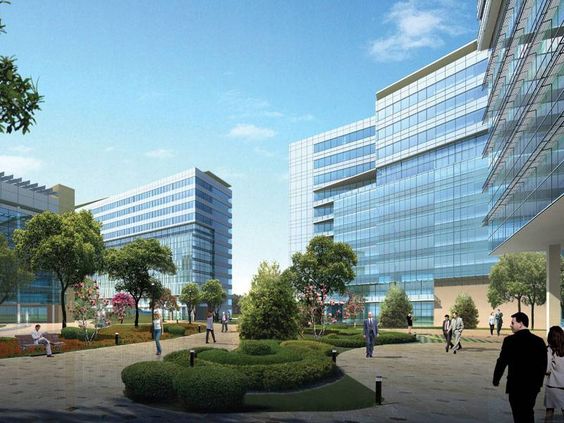Policy Reforms Fueling Expansion in India's Commercial Real Estate Sector
Read latest blogs and articles from Housystan

The Information mentioned here was last updated on:
29/1/2026Policy Reforms Fueling Expansion in India's Commercial Real Estate Sector
India's commercial real estate sector is booming, and it's no accident. Thanks to a series of strategic policy reforms, the industry is experiencing a notable expansion. Let's delve into these reforms, understand their impact, and explore what this means for the future of commercial real estate in India.
The Foundation of Growth: Government Initiatives
- Verified Tenants/Buyers
- Unlimited Property Listing
- Zero subscription/charges fee
To understand the current growth in India's commercial real estate sector, we must first look at the government's role. Several key policy reforms have been implemented, laying a strong foundation for growth.
1. Real Estate (Regulation and Development) Act, 2016 (RERA)
- Transparency and Protection: RERA was a game-changer, aiming to enhance transparency and protect investor interests. By requiring developers to register their projects and disclose all relevant details, RERA builds trust among buyers and sellers.
- Timely Delivery: The act mandates timely delivery of projects, reducing delays and enhancing investor confidence.
2. Goods and Services Tax (GST)
- Simplified Taxation: Before GST, the real estate sector was plagued by multiple indirect taxes. The introduction of GST streamlined the tax structure, reducing the tax burden and simplifying procedures.
- Increased Efficiency: By unifying the tax regime, GST has facilitated ease of doing business, encouraging more investment in commercial real estate.
3. Benami Transactions (Prohibition) Amendment Act, 2016
- Curbing Black Money: This act was pivotal in curbing the presence of unaccounted money in the sector. By promoting transparency in property transactions, it enhances trust, attracting more genuine investors.
4. Foreign Direct Investment (FDI) Policy Revisions
- Relaxed Norms: The easing of FDI norms has opened doors to foreign investors, bringing in much-needed capital to fuel growth.
- Diversified Investment Options: With relaxed regulations, international investors now have diversified opportunities, from commercial spaces to large-scale office complexes.
The Ripple Effect: Impact on Commercial Real Estate
These policy reforms have had a profound impact on the commercial real estate landscape. Here's how they contribute to the sector's expansion.
Increased Investor Confidence
- Trust as a Catalyst: As transparency increases, so does investor confidence. When investors trust the market, they're more likely to invest substantial amounts, boosting the overall sector.
- Long-term Investments: Greater transparency and regulatory protections encourage long-term investments, fostering stable growth.
Rise in Commercial Real Estate Projects
- Diverse Offerings: There's now a wider range of commercial real estate projects, from modern office spaces to retail complexes and industrial parks.
- Tech-enabled Spaces: The demand for tech-enabled work environments is booming, and developers are responding with innovative and flexible workspace solutions.
Enhanced Infrastructure
- Smart Cities Initiative: The government's push for smart city development is driving demand for modern commercial properties equipped with state-of-the-art facilities.
- Connectivity: Improved infrastructure, including better transportation and communication networks, makes commercial properties more attractive.
Opportunities and Challenges
While the policy reforms have paved the way for growth, understanding the opportunities and challenges is crucial.
Opportunities
1. Urbanization: Rapid urbanization in India is leading to increased demand for commercial spaces, particularly in metropolitan cities.
2. Emergence of New Business Hubs: Tier 2 and Tier 3 cities are emerging as new business hubs, expanding the commercial real estate horizon.
3. Technological Advancements: Integration of technology in real estate is opening new avenues for smart workspaces and sustainable building practices.
Challenges
1. Regulatory Hurdles: Despite improvements, navigating regulatory approvals can still be complex and time-consuming.
2. Economic Fluctuations: Global economic conditions can impact investment flows, posing a challenge for steady growth.
3. Environmental Concerns: Sustainable development practices are essential to minimize the environmental impact of commercial real estate projects.
Future Outlook: What's Next?
Looking ahead, several trends are poised to shape the future of India's commercial real estate sector:
- Sustainability Practices: Emphasis on environmentally friendly construction processes will grow, aligning with global standards.
- Flexibility in Workspaces: The rise of hybrid work models will drive demand for flexible office spaces, catering to the needs of modern businesses.
- Technology Integration: From smart building systems to virtual tours, technology will continue to revolutionize how commercial spaces are designed, built, and managed.
Conclusion: The Road Ahead
By providing a conducive environment through strategic reforms, India is well on its way to becoming a global hub for commercial real estate. With sustained policy support, the sector is ready for unprecedented growth, offering exciting opportunities for both domestic and international investors.
The stage is set for India's commercial real estate sector to reach new heights, riding on the back of robust policy reforms, innovative practices, and an ever-expanding urban landscape. As the country continues to evolve, this sector promises to be a vital contributor to India's economic progress and urban development.